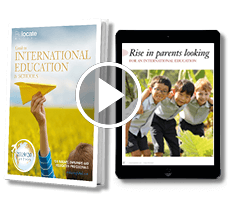Choosing a school in Thailand
The vibrant international school scene in Thailand offers plenty of high-quality education opportunities for families on the move, though demand is high. The country’s aspiration to become a centre for international education in Southeast Asia should increase the choice of schools still further.

Bangkok Patana, Thailand
Education in Bangkok
Bangkok dominates the market, with 106 schools. The city is renowned for its traffic congestion. Families already based there suggest that new expatriates find a good school close to home, or near an MRT (Bangkok’s fast and efficient Mass Rapid Transit network) station, to avoid long and difficult commutes.Most of Thailand’s major cities have one or two international-school options. Phuket has 12.Demand for places in Thailand
As well as expatriates, wealthy local families are increasingly seeking places at Thailand’s international schools. This is partly because of dissatisfaction with the country’s national education system, and partly because of the increased opportunities for higher education that international schools offer their students.As a result, a number of the leading international schools in Thailand are in very high demand, and some have waiting lists. There is no government limit on the number of local students who can attend international schools. Some schools do set a cap, however, to ensure availability for expatriate families and maintain a diverse student intake that reflects the international nature of the school.
There is no government limit on the number of local students who can attend international schools. Some schools do set a cap, however, to ensure availability for expatriate families and maintain a diverse student intake that reflects the international nature of the school.A range of international school options
Of Thailand’s international schools, 52 per cent follow the National Curriculum of England, 32 per cent offer a US-style curriculum, and 14 per cent deliver one or more of the International Baccalaureate (IB) programmes. These are the Primary Years Programme (PYP), the Middle Years Programme (MYP) and the Diploma Programme (DP).Bangkok Patana School and the International School Bangkok are established and popular. Both have an excellent reputation, with students achieving above-average exam results year after year.Bangkok Patana was established in 1957 and is Thailand’s original British international school. It has over 2,200 students of 65 different nationalities, and is located in the southeast of the city. The school follows the National Curriculum of England and, for senior students, offers the IBDP.KIS Bangkok is an IB World School, offering the full IB programme and is located on a four-acre campus in central Bangkok. It has nearly 700 students from 55 countries, from ages three to 19.“There are a few schools in Bangkok, such as ours, that offer three IB programmes (PYP, MYP and the IB Diploma) and some that just offer the IB Diploma in the last two years of high school,” says Linda Belonje, director of marketing and development at the school.“The IB Diploma is widely recognised and respected by universities all around the world, offering not only high rates of acceptance, but also – in some countries – university credits or scholarships.”Brighton College International School Bangkok is a collaborative partnership between one of England’s top independent schools – Brighton College UK and a Thai company – Ocean Group. It opened in 2016 and is an academically selective school catering for students from ages 2–19. It offers the English National curriculum with children taking the IGCSE and A levels.Other established, high-profile international schools in Thailand include the British independent schools of Harrow, Shrewsbury and Bromsgrove.More schooling options
Based on the healthy growth of its international-school community, Thailand has an aspiration to become a centre for international education in Southeast Asia. This suggests there will be continued government support for new international schools, and continued accessibility of places for local children – a move that helps to drive the growth of schools.Following the establishment of the ASEAN Economic Community in January 2016 the number of international schools is expected to continue growing. This single market, involving a number of Southeast Asian countries, aims to expand business opportunities, enticing more multinationals to the region.This article is from Relocate Global's Guide to International Education & Schools 2019/20 which is packed with expert tips and information for those relocating and the professionals supporting them. For volume options, co-branded editions, digital or online licence agreements and advertising opportunities, contact Fiona Murchie at +44 (0)1892 891334 or email fiona@relocatemagazine.comNow available as an ebook on Amazon! Simply download from Amazon onto your Kindle, mobile phone or tablet to read wherever you are!
Subscribe to Relocate Extra, our monthly newsletter, to get all the latest international assignments and global mobility news.Relocate’s new Global Mobility Toolkit provides free information, practical advice and support for HR, global mobility managers and global teams operating overseas.
 Access hundreds of global services and suppliers in our Online Directory
Access hundreds of global services and suppliers in our Online Directory For more education and school-related news, visit our Education and Schools pages.© 2019. This article first appeared in the 2019/20 edition of the Guide to International Education & Schools published by Relocate Global, Spray Hill, Hastings Road, Lamberhurst, Kent TN3 8JB. All rights reserved. This publication (or any part thereof) may not be reproduced in any form without the prior written permission of Relocate Global. Relocate Global accepts no liability for the accuracy of the contents or any opinions expressed herein.
For more education and school-related news, visit our Education and Schools pages.© 2019. This article first appeared in the 2019/20 edition of the Guide to International Education & Schools published by Relocate Global, Spray Hill, Hastings Road, Lamberhurst, Kent TN3 8JB. All rights reserved. This publication (or any part thereof) may not be reproduced in any form without the prior written permission of Relocate Global. Relocate Global accepts no liability for the accuracy of the contents or any opinions expressed herein.
































